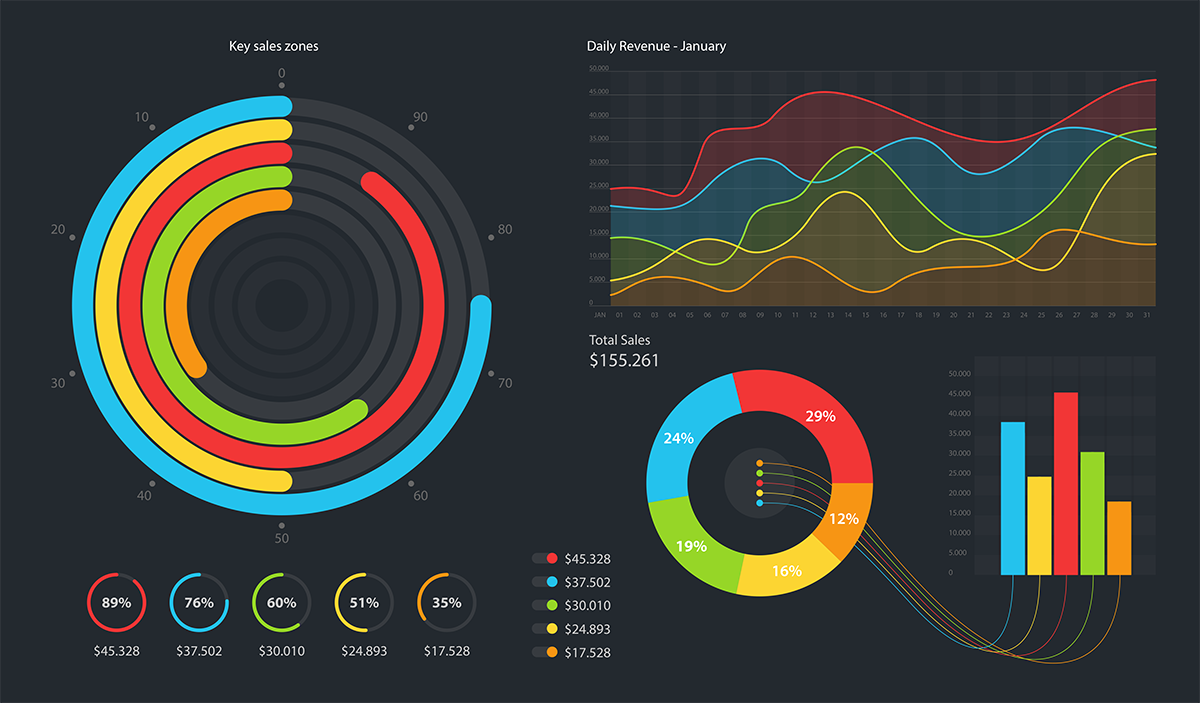
Dashboards are a single page or display that provide an array of curated information useful to the viewer. Dashboards give decision makers the ability to make important and timely decisions by having relevant and current data available in a minimum amount of reading time.
While dashboards are generally helpful, you need to choose the one that works best for your company’s objectives and goals. Here are three types of business dashboards to consider.
Strategic dashboards
Ideal for senior managers and executives, strategic dashboards are designed to help identify potential opportunities for business expansion and improvement. This type of dashboard gives a bird’s-eye view of your business and track performance metrics against enterprise-wide strategic goals.
They summarise performance over set time frames: past month, quarter, or year. They can contain anything from overall sales numbers to sales and revenue comparisons to inventory levels, making it easy for executives to understand the overall health of the organisation and monitor the long-term company strategy.
Operational dashboards
Business owners use operational dashboards to monitor and measure in real time the effectiveness and efficiency of their employees’ progress in relation to their targets. Since these dashboards focus on tracking operational processes, they are often more detailed than strategic dashboards and are usually viewed by junior levels of management multiple times throughout the day.
They are also commonly found in departments that need to respond to critical information quickly, such as marketing and operations. They help departments stay proactive and ahead of problems. For example, marketing teams can use this type of dashboard to monitor their campaign’s metrics such as cost per acquisition, total number of clicks, total acquisitions gained, and the total amount spent. Any significant changes would immediately alert the team. The operations team of manufacturing firms, on the other hand, may use this to track products manufactured, number of defects, complaints, and returns. They are then alerted right away when performance falls below targets.
Analytical dashboards
When it comes to creating and implementing strong business strategies, understanding the trends and events in your data is crucial. Analytical dashboards use volumes of data collected over time so you could compare current against historic data, enjoy in-depth analysis, identify patterns and opportunities, and determine why processes are working in certain departments. These dashboards present complex data, utilising complex models and what-if statements, so they are commonly just used by staff with advanced training such as business analysts.
How do I know which dashboard to choose?
To help you choose which dashboard best suits your needs, you can ask yourself the following questions:
#1. What business problems are we trying to solve?
- Strategic dashboards – Top-line organisational KPIs
- Operational dashboards – Data awareness and time-sensitive data
- Analytical dashboards – Trends or deeper insights
#2. Who will be using the dashboards?
- Strategic dashboards – Executives, directors
- Operational dashboards – Business managers
- Analytical dashboards – Business analysts, data analysts
#3. What are our goals?
- Strategic dashboards – Strategic goals, such as achieving KPI targets
- Operational dashboards – Employee awareness and tracking against goals
- Analytical dashboards – Analytic goals, such as visibility into key processes
Dashboards concentrate all data, metrics, and parameters in one place, bringing a totally new dimension to business intelligence. Your company can significantly benefit from the right dashboard.
Diamond IT excels at dashboard development
Our Software Development team are established experts in developing dashboards to unlock your data's potential. If you are interested in what we can develop for you, give us a call on 1300 307 907 or contact us via the form below.
Published with permission from TechAdvisory.org. Source.




